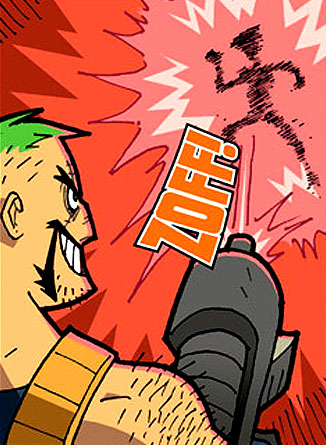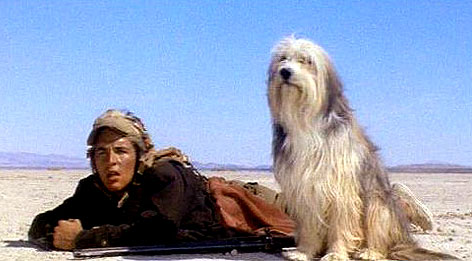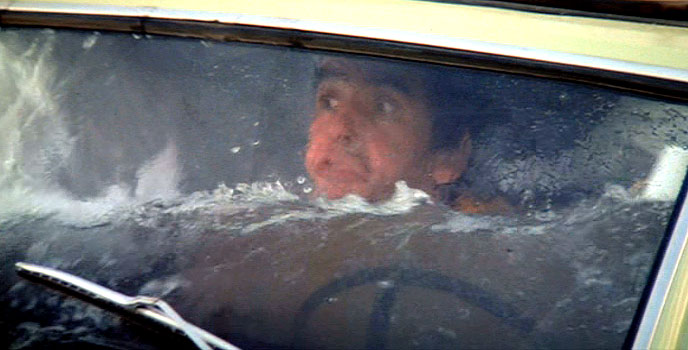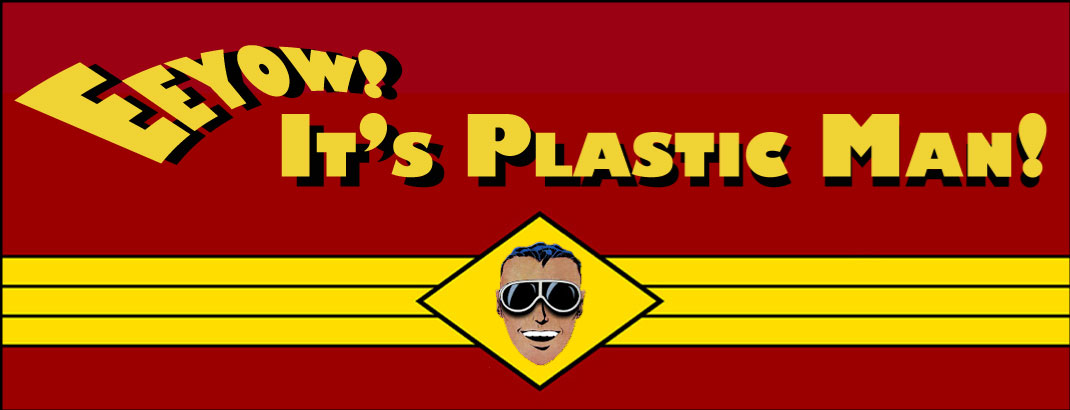Posted: July 19th, 2010 | Author: Max Romero | Filed under: Uncategorized | 2 Comments »

Superman III has a problem – it suffers by comparison.
When the original Superman premiered in theaters, it set a standard with a nearly pitch-perfect cast led by Christopher Reeve, who seemed to embody both the Big Blue Boy Scout and mild-mannered Clark Kent. Throw in a mad scientist-style plot about sinking California into the ocean and you had what everyone expected from a movie about the Man of Tomorrow.
(True story: When I saw Superman when it opened [yes, I’m old – shut up], the audience burst into spontaneous applause the first time Clark changed into costume.)
Superman II raised the stakes, going a little darker and giving Supes a trio of Kryptonian villains who could actually give him a run for his money. Then Superman gave up his powers for Lois Lane (Margot Kidder). The Phantom Zone cons conquered the United States. Eventually Superman pulled off an amazing double-cross, beat the bad guys and used some sort of Kryptonian amnesia poke (!) to make Lois forget his secret identity – in essence giving up true love for duty. Not a dry eye in the house.
And then along came Superman III, a movie that put a lot more emphasis on humor – a misguided choice and probably a reason Richard Pryor is one of the prominent “bad guys.†(Don’t worry, he’s not really bad.) The movie even opens with a sort of Rube Goldberg series of accidents that starts with a hot woman and ends with a man nearly drowning inside his car in downtown Metropolis. At one point Clark (who’s walking to work) puts out a flaming penguin with his super-breath.
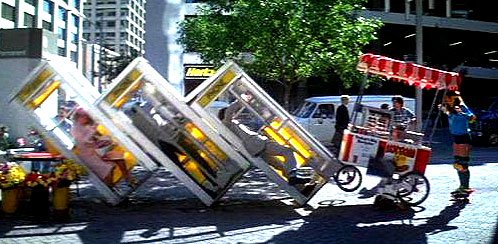
That’s when I realized: Holy shit – this movie is love letter to the Silver Age. And I’ll be damned if I don’t love it for that.
We catch up with Clark at the Daily Planet where Lois (Kidder), Jimmy Olsen (Marc McClure) and Perry White (Jackie Cooper) are basically shouting to each other. Lois is pushing for her vacation and Clark is pitching a story about going home for your high school reunion, mostly because he’s going back to Smallville for his high school reunion. They both get the thumbs-up and everyone’s off.
This lays the groundwork for new characters and a setting that’s different for the Superman movies – Lois and Perry are only in the beginning and end of the movie, while Jimmy kinda slouches along to Smallville with Clark until he manages to break his leg covering a chemical fire they come across on their way to Kansas. Superman freezes a nearby lake and uses the water to put the fire out, keeping the chemical in the factory from overheating and turning into a super-corrosive acid cloud. Then he sends Jimmy away in an ambulance and that’s it for Olsen.
Meanwhile, Gus Gorman (Pryor) is on the dole, and after getting turned down for unemployment (hey, things are tough all over, even in Metropolis) winds up in a computer programming class where he discovers he’s a computer genius. Lucky! Soon he lands a job, receives his first paycheck and WHAT THE HELL? Gus is blown away by taxes and decides to use his mad skillz to steal half-cents from the company, netting himself a check for 85 thousand bucks.

OK, brief aside: This is one of the best known devices in the movie, and has been referenced in various movies and TV shows and blah-blah-blah ever since. What’s weird though is that in Superman III the whole thing takes maybe 10 minutes. Seriously. Gus gets his money, an old coot of an accountant notices the missing money right away and alerts boss Ross Webster (Robert Vaughn), and Gus immediately drives up in a new Ferrari and is totally busted. Done and done. It was more of a plot point in Office Space, for chrissakes. Do people remember this because they love the idea of free computer money?
Anyway, Webster blackmails Gus into helping him corner the coffee and oil markets, which involves hijacking a weather satellite to make tornadoes. Together with Ross’ sister Vera and his “psychic nutritionist†Lorelei (the hot woman from the opening credits) to round things out, the group puts their plan in motion.
Ross, though, is worried that coffee-hating tornadoes might attract Superman’s attention, so he has Gus come up with some synthetic kryptonite just in case. Gus is able to break down the kryptonite recipe except for one element, but luckily he has sweet, sweet cigarettes for inspiration and fills the gap with tar.
Meanwhile, Clark catches up with the adorable Lana Lang (Annette O’Toole) at the reunion (which apparently is about a week long). I honestly don’t know why O’Toole’s Lana isn’t a bigger nerd heartthrob. Where Kidder’s Lois is perfectly tough, smart and savvy, O’Toole is wonderfully sweet, charmingly flighty and doggedly determined to better her life for herself and her young son after divorcing her husband. Plus, she’s just so damn cute!
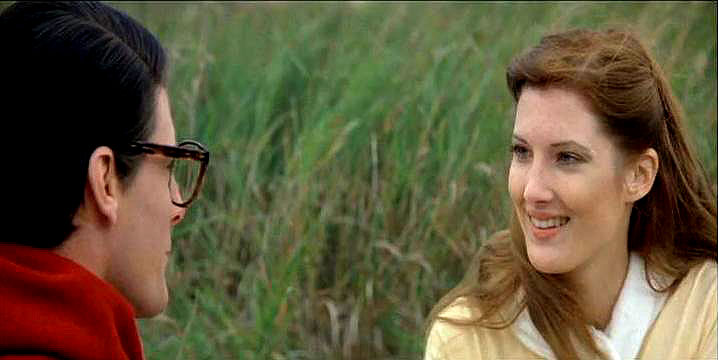
Clark thinks so too, and spends his “reporting†time taking Lana on picnics and helping her dorky son by secretly using his powers to help him get strikes at the bowling alley. He also deflects the advances of former Smallville High football star Brad, who spends most of his time trying to impress Lana with his wonderfully trashy drunkeness.
Eventually, the gang (disguised as military officers) crash a ceremony honoring Superman and they lay the fake kryptonite on him. And …nothing happens. At least nothing obvious, but we begin to see changes in Superman that lead to one of the greatest things to happen to cinema:
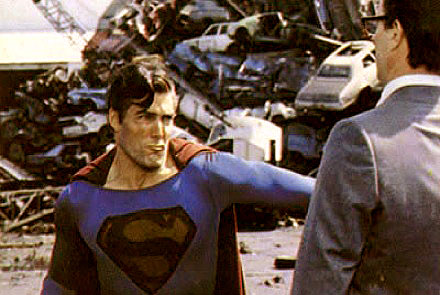
Asshole Superman.
The krypto-not starts changing Superman’s personality; he begins hitting lustily on Lana, then he straightens out the Leaning Tower of Pisa and blows out the Olympic Torch. Yes, it’s true – Superman’s a dick.
For an encore he goes to a bar and starts drinkin’, flicking peanuts with his super-strength and destroying all the whiskey and Courvoisier in the joint. Angry with himself, Superman flies off and ends up in a junkyard where he SPLITS UP INTO CLARK KENT AND ASSHOLE SUPERMAN. And then he starts a fistfight with himself, alternately throwing junk at himself and throwing himself into junk. At one point a trash compactor is involved.
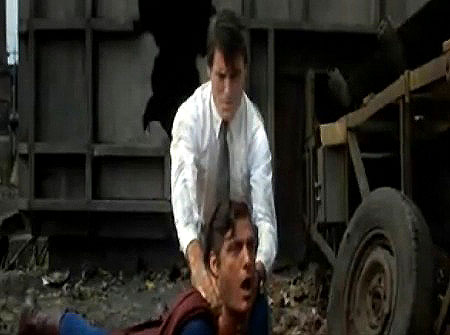
Clark finally chokes Asshole Superman into submission, making him fade away and letting Clark be Good Guy Superman again. Which is a good thing, because while all this has been going on Ross Webster has been building a super-computer to Gus’ specifications and since Gus is a genius the computer of course becomes SELF-AWARE (like those kids on The Hills).
And it’s got a kryptonite ray, so bad news for Superman. But luckily Gus (see, I told you he’s not really a bad guy) takes an ax to the ray. Things really get crazy then, as the super-computer starts draining power from the grid and the cavern (did I mention the super-computer was built in a cavern? At the bottom of the Grand Canyon?) gets sparky. Everyone escapes but Vera, who gets pulled into the computer and comes out a cyborg. A motherf’n cyborg!
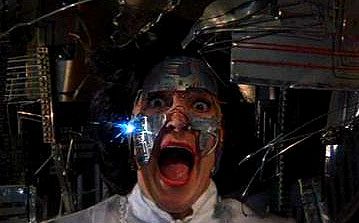
Another brief aside: When I mentioned I’d be watching this movie, a lot of people would tell me how the Vera-cyborg scared the crap out of them when they were kids. This is because the Vera-cyborg is messed up. Yeah, yeah, when you look at it now it’s easy to dismiss it as spray-painted cardboard and stray alligator clips, but it’s still weird and creepy and uuugh. I both love and am repelled by the Vera-cyborg.
As a cyborg Vera has all sorts of nutty powers … well, really, she mostly uses an energy beam to stick her brother and Lorelei to the cave walls like grocery lists with 80s-style haircuts. Things are getting out of hand, so Superman flies to the chemical lab and comes back with (wait for it … waaaiit for it …) the acid he kept from vaporizing earlier!
With all the electricity arcing around the acid quickly overheats, destroying the computer (yay!) and turning Vera back to her normal self (huh?). Superman sends the cops to pick up the Websters and Lorelei, but takes Gus to get a job at a coal mine. Yeah, I don’t know either. Then Superman goes home, where Lana has gotten a job as a secretary at the Daily Planet and The End.
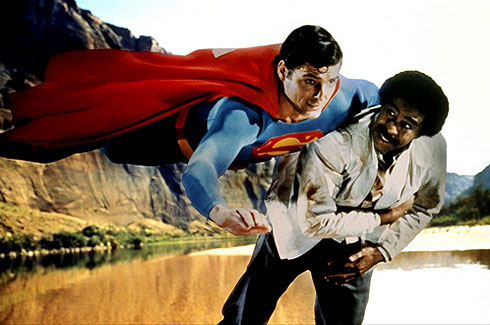
Let’s be clear about one thing: Superman III is certainly not the best Superman movie out there. It’s not even the second best. The movie leans heavily on the comedic side of the fence, which often falls flat. Richard Pryor is wasted here (well, not wasted … you know what I mean). The movie feels like a few really inspired scenes loosely stitched together and wrapped in awkward.
But that doesn’t mean I don’t like it. Those few really inspired scenes are great, and have become iconic in their own small way. Christopher Reeve continued to bring the goods in spite of the script, and Annette O’Toole was the perfect choice for gentle but strong-willed Lana. All together it’s a disjointed, high-concept and bat-shit crazy jumble – which means it’s a live-action version of a Silver Age Superman comic. It’s a lot of fun if you’re willing to go along for the ride. And if that ride includes Superman-Clark junkyard fights and wide-eyed killer cyborgs, then I’m in.
…
Movie Clubbin’!
Hectic Engine
Posted: July 12th, 2010 | Author: Max Romero | Filed under: Uncategorized | Tags: obit | 1 Comment »
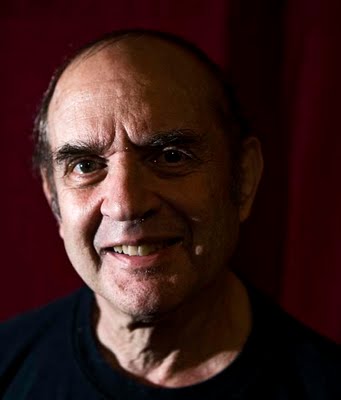
I don’t think Harvey Pekar set out to redefine a segment of comic book storytelling. I don’t think he planned to become the example others would follow, in both style and tone. And I seriously doubt Pekar ever meant to become a legend.
The fact that he accomplished all of those things, primarily with an unflinching dedication to honesty that he shared with his audience, is a testament to his impact and importance as a writer and collaborator. The news of his death today at the age of 70 is a loss for the industry and for the countless readers who learned to see more than the mundane in everyday life thanks to his unfiltered stories.
Pekar was the kind of writer you hear about but so rarely see; someone who saw stories all around him, glimpsed the extraordinary in the ordinary, and who would then share – who seemed to NEED to share – what he saw with others. Often those stories were awkward. Sometimes they were even difficult to read. But, in the best way possible, they were always real.
From American Splendor to Our Cancer Year to The Quitter and everything in between and since, Pekar helped define and advance indie comics and the autobiographical genre. Anyone who has tried to tell a story taken from or even set in real life since Pekar first appeared on the underground comix scene has been influenced by him (whether they know it or not).
The genre – indeed, the medium – owes a debt of gratitude to Harvey Pekar. We’ll never see another like him.

